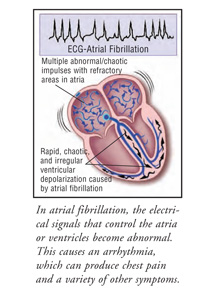 Abnormal Heart Rhythm
Abnormal Heart Rhythm
The atria are the two smaller upper chambers of the heart that pump blood into the ventricles (the two larger lower chambers of the heart) after they receive an electrical signal. The ventricles, in turn, receive an electrical signal to pump blood out of the heart into the lungs and the rest of the body’s circulatory system. When the electrical impulses that control the atria or ventricles become irregular, the result is an arrhythmia, or abnormal heart rhythm. If the heart rhythm is abnormal, the pumping action of the heart will not work correctly. The most common of all abnormal heart rhythms is atrial fibrillation.
Atrial fibrillation occurs when the atria contract rapidly and in a haphazard way due to a problem with the electrical signals they receive. This fast and disorganized contraction is called fibrillation. When the atria fibrillate, they are not able to effectively pump blood to the ventricles. Some of the blood in the atria does not flow out into the ventricles, and this residual blood can cause blood clots, which can lead to a stroke. The ventricles, which normally pump the blood into the circulatory system with each strong, regular contraction or heartbeat, pump the blood they receive from the fibrillating atria in an irregular way.
Although some people with atrial fibrillation do not notice any symptoms, many patients with this arrhythmia suffer from chest pain, shortness of breath, and palpitations. A blood clot leading to a stroke, a heart attack, or heart failure can be the result of prolonged, untreated atrial fibrillation.
The goal of treatment in patients with atrial fibrillation is to slow the heart down in order to avoid symptoms and prevent complications, and attempt to change the heart rhythm back to a normal rhythm, either through medications or cardioversion (an electric shock to the heart).
Irregular Electrical Impulses Cause Atrial Fibrillation
More than 2 million Americans suffer from atrial fibrillation, making it the most common of all heart arrhythmias. Although many people with atrial fibrillation are unaware of their arrhythmia until it is discovered during a routine visit to the doctor, most people have occasional or persistent symptoms of palpitations or skipped beats, chest pain, or shortness of breath.
Risk Factors and Diagnosis
People over age 60 are at a higher risk of developing atrial fibrillation. Conditions such as an overactive thyroid gland, untreated high blood pressure or high cholesterol, or heart valve damage can all increase the risk of atrial fibrillation. Even some medications and alcohol can cause heart arrhythmias.
The diagnosis of atrial fibrillation is made using a variety of tests, including an electrocardiogram (ECG or EKG), an echocardiogram, or a monitor worn throughout the day (and sometimes the night) to record heartbeats and relate them to symptoms.
Treatment Options
Although atrial fibrillation is usually not a life-threatening condition, it should be treated in order to avoid complications. The treatment for atrial fibrillation depends on the general health of the patient, how often the symptoms occur and their degree of seriousness, and how long the arrhythmia has been present. For newly diagnosed atrial fibrillation that is causing distressing symptoms, cardioversion therapy may be the best way to convert the heart back to a normal rhythm. Cardioversion is a procedure during which the heart is given an electrical stimulation to revert the abnormal electrical signals to normal. Cardioversion can also be successful using intravenous or oral antiarrhythmic drugs and monitoring the heart rhythm in the hospital to see if returns to normal. In patients who do not convert to a normal heart rhythm after cardioversion or in whom this procedure is not appropriate, oral drugs that help slow down the fibrillation and control the heartbeat are the best options. These antiarrhythmic medications allow people with chronic atrial fibrillation to live normal lives with this condition. In addition, before cardioversion or while on antiarrhythmic medications, most patients with atrial fibrillation will receive blood-thinner medications (warfarin, heparin, or aspirin) to prevent blood clots and potential stroke.
Prognosis for Patients with Atrial Fibrillation
For some patients with a diagnosis of atrial fibrillation, treatment can return their heart to a normal beat pattern. For those patients who have chronic atrial fibrillation, medications can help control symptoms and prevent complications such as stroke, heart attack, or heart failure.
Your pharmacist can answer your questions about antiarrhythmic medications and bloodthinner drugs used to treat atrial fibrillation.





